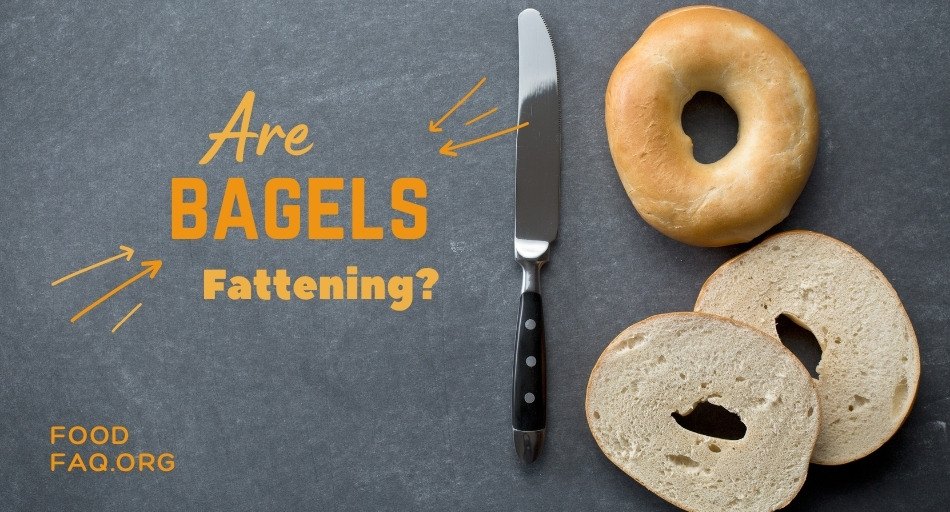Bagels are one of the most loved and consumed foods around the world. They’re delicious and can be eaten for any meal, at any time of the day.

Bagels are high in carbs, which leads many people to believe that they’re fattening and unhealthy.
So, should you avoid eating bagels when trying to lose weight? Are bagels bad for you?
Table of Contents
Are bagels fattening?
While they’re considered to be a high-carb food, bagels can be a great addition to a healthy diet, even if you’re trying to lose weight. The only thing to keep in mind is to keep your servings small, include a lot of veggies and protein sources, and follow an otherwise healthy diet.
If you keep them healthy, bagels provide you with a decent amount of fiber and several minerals too. So, adding them to your diet isn’t a bad idea.
How many calories are in bagels?
One medium plain bagel contains around 289 calories. This is a large amount, so make sure to consume small servings and pair your bagel with a healthy source of protein.
For example, if you eat your bagel with some lettuce, spinach, tomatoes, and healthy ham, you won’t add too many calories, but you’ll still be full and satiated after eating.
So, if you do it right, bagels can be a good addition to a weight loss diet.

The calories also increase a lot if you’re ordering your bagel from a fast food joint. For example, one plain bagel from McDonald’s is not only small but contains around 260 calories.
It’s also deficient in many vitamins and minerals that store-bought or homemade bagels contain.
Bagels from fast-food restaurants also contain a lot of sodium, over 20% of your daily recommended need for this nutrient.
So, if you’re trying to lose weight, make sure to avoid this type of bagel.
Are bagels good for you?
When looking at the nutritional profile of bagels, it’s important to remember that some commercially sold bagels are enriched.
As a result, they may contain higher amounts of certain nutrients, such as calcium, phosphorus, and magnesium.
Even unenriched bagels contain various minerals and vitamins. For example, bagels are a good source of manganese.
This mineral contributes to the formation of connective tissue, bones, blood-clotting factors, and sex hormones. So, make sure to take in enough foods containing this micronutrient.
Even though bagels are high in carbohydrates, they actually contain a great dose of fiber.
Aside from helping you lose weight, the fiber found in bagels can help soak up excess stomach acid.
This reduces the risk of severe acid reflux and GERD symptoms. In addition, it can help reduce inflammation and irritation to your digestive tract.

But make sure to remember that the whole-grain and oat bran bagels are the highest in fiber. So, you might want to choose these.
Bagels also provide you with a decent amount of thiamin. This vitamin, also called vitamin B1, helps keep your nervous system healthy, including the brain, muscles, heart, stomach, and intestines.
It also helps electrolytes flow through your body, improving hydration and digestion.
Because of that, thiamin is very important for muscle contractions and the transmission of nerve impulses.
Should you eat bagels when trying to lose weight?
If you make and serve them right, you can include bagels on a weight loss-friendly diet. One medium-sized bagel contains 22% of your daily recommended need for protein.
Protein helps you feel fuller after eating as well as prevents lean muscle mass loss. Muscles help boost your metabolism and improve fat loss.
So, eating high-protein foods is beneficial when trying to lose weight. What’s more, if you add some protein to your bagel, like turkey, chicken, or ham, you can get even more out of your bagel.
Bagels are also a great source of fiber, containing 2.4 g in a single medium-sized bagel. Fiber is an important nutrient for staying full after eating, which curbs your appetite and prevents overeating.
As a result, eating fiber-rich foods can aid in weight loss. If you’re looking for a bagel type that’s the highest in fiber, opt for oat bran bagel, as it contains almost twice as much fiber as regular bagels.
Are egg bagels fattening?

One medium egg bagel contains around 292 calories, which is still a lot. On the other hand, egg bagels are rich in several nutrients that regular bagels don’t contain.
For example, they provide you with more protein, thiamin, niacin, folate, iron, and selenium.
Because of that, egg bagels might be a better choice for you if you’re looking to shed some pounds and load up on vitamins and minerals.
Are oat bran bagels fattening?
One medium-sized oat bran bagel contains around 281 calories. As you can see, most bagels contain around the same number of calories, as long as you keep them plain.
There are nutritional differences, though. For example, oat bran bagels are higher in B vitamins and protein than standard bagels.
They also contain slightly more fiber, providing you with 4 g in a single serving. So, if you eat them with some spinach or lettuce and a good protein source, you should be able to incorporate this food into a weight loss-friendly diet.
How to make bagels less fattening?

Making bagels better for your weight loss goals is rather easy. One thing you have to do is make sure to control your serving size and stick to a small or medium bagel.
Additionally, try to avoid putting sour cream and cream cheese on your bagel. These are not only high in calories but also deficient in several important nutrients.
Instead, stick to fresh cheese, turkey ham, tomatoes, cucumbers, and ingredients like that.
Conclusion
While bagels are high in calories, they do contain some essential nutrients that can contribute to weight loss.
But in order to ensure that you won’t gain weight from them, make sure to serve them with some healthy veggies and a source of protein.
That way, you can create a healthy meal that can help you lose weight without giving up on your favorite foods.
